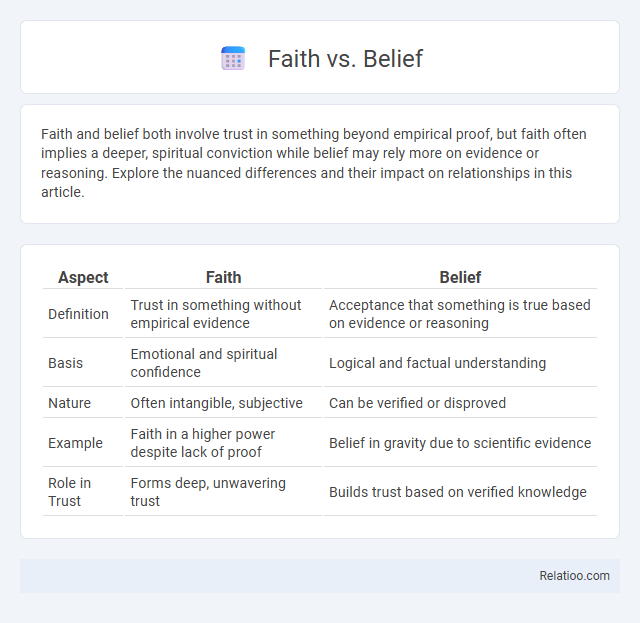Faith and belief both involve trust in something beyond empirical proof, but faith often implies a deeper, spiritual conviction while belief may rely more on evidence or reasoning. Explore the nuanced differences and their impact on relationships in this article.
Table of Comparison
| Aspect | Faith | Belief |
|---|---|---|
| Definition | Trust in something without empirical evidence | Acceptance that something is true based on evidence or reasoning |
| Basis | Emotional and spiritual confidence | Logical and factual understanding |
| Nature | Often intangible, subjective | Can be verified or disproved |
| Example | Faith in a higher power despite lack of proof | Belief in gravity due to scientific evidence |
| Role in Trust | Forms deep, unwavering trust | Builds trust based on verified knowledge |
Defining Faith and Belief
Faith and belief are often used interchangeably, but they hold distinct meanings in philosophy and theology. Faith is a deep trust or confidence in something or someone, often without empirical evidence, extending beyond mere acceptance of facts. Belief refers to the acceptance that certain statements or ideas are true, based on evidence or conviction, forming the cognitive foundation of your understanding.
Historical Origins of Faith and Belief
Faith and belief have distinct historical origins rooted in ancient philosophical and religious traditions; belief originates from the Latin word "credere," meaning to trust or entrust, and was historically associated with cognitive acceptance of propositions or ideas. Faith, derived from the Latin "fides," carries a deeper connotation of trust and loyalty often linked to spiritual conviction and divine assurance in theological contexts. The historical evolution of faith reflects its foundational role in shaping religious doctrines, while belief has evolved more broadly to encompass general acceptance in various cultural and intellectual paradigms.
Key Differences Between Faith and Belief
Faith involves a deep, often spiritual trust in something or someone without requiring empirical evidence, while belief is a mental acceptance or conviction based on evidence or personal experience. Faith is typically associated with religion and spirituality, emphasizing commitment and devotion, whereas belief can be secular and pertains to acceptance of factual or conceptual truths. The key difference lies in faith's reliance on trust and confidence beyond proof, contrasting with belief's foundation in cognitive acceptance.
Psychological Foundations of Faith vs Belief
Psychological foundations of faith involve an intrinsic trust in concepts or entities without empirical evidence, often tied to emotional and existential needs, whereas belief is a cognitive acceptance based on perceived evidence or reasoning. Faith encompasses a deeper, often unwavering conviction that influences motivation and behavior beyond conscious rationale, engaging brain regions linked to reward and emotional processing. Understanding these distinctions aids in exploring how individuals form worldviews and cope with uncertainty through different neurological and psychological mechanisms.
Faith and Belief in Religion
Faith in religion involves a deep, often unwavering trust in a higher power or divine truth that transcends empirical evidence. Belief refers to the acceptance that certain religious doctrines or teachings are true, often based on personal conviction or cultural tradition. While belief can be intellectual and subject to change, faith typically embodies a more profound emotional and spiritual commitment within religious practice.
The Role of Evidence: Faith versus Belief
Faith relies on trust without requiring empirical evidence, often rooted in spiritual conviction, while belief represents acceptance that something is true based on evidence or reasoning. In epistemology, faith symbolizes confidence beyond proof, whereas belief adjusts with the presence or absence of supporting data. Understanding this distinction clarifies the cognitive framework where faith remains constant despite empirical challenges, contrasting belief's dependence on substantiated information.
Cultural Influences on Faith and Belief
Cultural influences significantly shape faith and belief by embedding specific religious practices, symbols, and narratives within societal norms. Your perception of faith is often molded by the cultural context, affecting how belief systems are adopted and expressed across generations. This interplay highlights the dynamic relationship between individual spirituality and collective cultural identity.
Faith, Belief, and Personal Identity
Faith grounds personal identity by providing a stable framework of trust in values or entities beyond empirical proof. Belief represents the cognitive acceptance of certain truths or doctrines that shape one's worldview and self-conception. Together, faith and belief intertwine to influence how individuals define themselves and relate to their inner convictions and external realities.
Challenges in Distinguishing Faith from Belief
Distinguishing faith from belief poses challenges due to their overlapping nature in representing trust or confidence in something unseen or unproven. Faith often implies a deeper, more spiritual conviction beyond empirical evidence, while belief can be based on personal acceptance or evidence to varying degrees. Your challenge lies in understanding that faith transcends intellectual assent, engaging emotional and existential dimensions that belief alone may not fully encompass.
Harmonizing Faith and Belief in Modern Society
Harmonizing faith and belief in modern society requires recognizing the dynamic interplay between personal convictions and collective values that shape cultural identities. Your ability to integrate diverse religious faiths with evolving belief systems fosters social cohesion and mutual understanding. Embracing this balance encourages tolerance, empathy, and inclusive dialogue across different communities.

Infographic: Faith vs Belief
 relatioo.com
relatioo.com